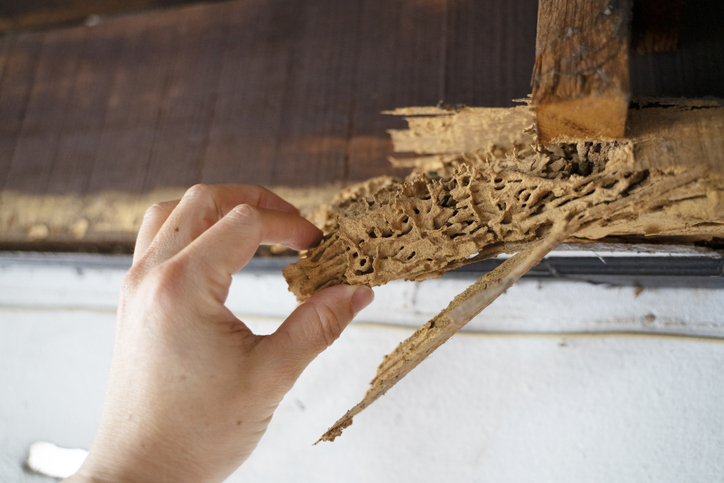Monsoon Season in Phoenix: A Perfect Storm for Termite Infestations
Effective Prevention Strategies for Termite Control
Phoenix, known for its scorching summers and mild winters, experiences a unique weather phenomenon known as the monsoon season. Intense thunderstorms, heavy rainfall, and high humidity from June to September hit the city. While these storms bring much-needed relief from the relentless heat, they also create the perfect conditions for termite infestations. The increased moisture in the soil and wood around homes provides an ideal environment for termites to thrive and multiply.
As a homeowner in Phoenix, you know that it’s crucial to be aware of the heightened risk of termite activity during the monsoon season. Termites can cause significant damage to the structural integrity of your home if left unchecked. In this blog, we’ll explore why monsoon season is a critical time for termite infestations, how to identify signs of termite activity, and effective prevention strategies to protect your home.
Why Monsoon Season Increases Termite Activity
Monsoon season in Phoenix brings a unique set of challenges for homeowners, particularly when it comes to termite infestations. The combination of increased moisture, warmth, and abundant food sources creates an ideal environment for termites to thrive. Understanding why these conditions are so favorable for termites can help you take proactive steps to protect your home.
- Moisture: The heavy rains during the monsoon season significantly increase the moisture content in the soil and wood around your home. Termites are attracted to damp environments as they need moisture to survive and build their colonies.
- Warmth: Phoenix’s warm climate, combined with the humidity of the monsoon season, accelerates termite activity. The warmth speeds up their metabolism and reproductive cycles, leading to rapid colony growth.
- Food Sources: Termites feed on cellulose found in wood and other plant materials. The monsoon season often results in fallen branches, wet wood, and other organic debris around homes, providing termites with an ample food supply.
By understanding these factors, you can better prepare and implement effective termite prevention strategies.
Common Signs of Termite Infestations During Monsoon

During the monsoon season, the increased moisture and warmth can lead to a surge in termite activity. One of the most common signs of a termite infestation is the presence of mud tubes. These pencil-sized tunnels are constructed by termites to travel between their colony and food sources, protecting them from predators and maintaining the necessary humidity levels. You might find these tubes on your home’s foundation, walls, or other wooden structures.
Another telltale sign of termite activity is damaged wood. Termites consume wood from the inside out, leaving a thin veneer on the surface. If you tap on the wood and it sounds hollow or if you notice blistering or darkening, it could indicate termite damage. Additionally, you might find small piles of frass, which are termite droppings, near the damaged wood. These tiny pellets are often mistaken for sawdust.
Swarms of winged termites, also known as alates, are another indicator of an infestation. These reproductive termites emerge in large numbers during the monsoon season to mate and establish new colonies. You might see them flying around lights or find discarded wings near windowsills and doorways.
Effective Prevention Strategies for Termite Control
Preventing termite infestations during the monsoon season requires a proactive approach. By implementing effective strategies, you can protect your home from these destructive pests. Here are some key prevention methods to consider:
- Reduce Moisture: Ensure that your home’s foundation and wooden structures remain dry. Fix any leaks in your plumbing, roof, or gutters, and use dehumidifiers in damp areas like basements and crawl spaces. Proper drainage around your home is also essential to prevent water accumulation.
- Remove Food Sources: Clear away any dead wood, fallen branches, and other organic debris from around your home. Store firewood and lumber away from your house and elevate them off the ground. Regularly inspect and maintain wooden structures to ensure they are in good condition.
- Seal Entry Points: Termites can enter your home through even the smallest cracks and gaps. Seal any openings in your foundation, walls, and around utility lines. Installing physical barriers, such as stainless steel mesh or sand, can also help deter termites.
By following these prevention strategies, you can significantly reduce the risk of termite infestations during the monsoon season.
How Arizona Termite Specialists Can Help
When it comes to protecting your home from termite infestations during the monsoon season, we at Arizona Termite Specialists are your trusted local experts. With over 20 years of experience in the Phoenix area, we understand the unique challenges posed by the region’s climate and termite activity. Our specialized knowledge and tailored solutions ensure that your home remains safe and termite-free.
- Comprehensive Inspections: We offer thorough termite inspections to identify any signs of infestation or potential risk areas. Our detailed assessments help in early detection and effective treatment planning.
- Targeted Treatments: Utilizing the latest technology and methods, we provide targeted termite treatments that address the specific needs of your property. Whether it’s soil treatments, bait systems, or wood treatments, we have the right solution for every situation.
- Preventative Measures: Beyond treatment, we offer preventative services to protect your home from future infestations. This includes moisture control, sealing entry points, and regular maintenance checks to ensure long-term protection.
With Arizona Termite Specialists, you can have peace of mind knowing that your home is in capable hands. Our local expertise and commitment to customer satisfaction make us the go-to choice for termite control in Phoenix. Don’t wait until it’s too late—contact us today at (602) 900-9799 for a free estimate and take the first step towards safeguarding your home.


